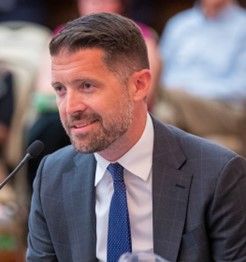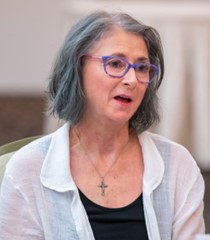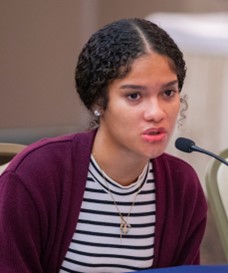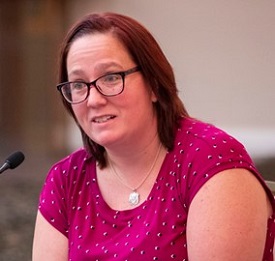September 12, 2023 Policy Hearing Takeaways
September 12, 2023
Education: A Lifeline to Opportunity
On September 12th, in Philadelphia County, the Republican Policy Committee brought together a diverse group of voices from across the educational spectrum to share the need for choice and opportunity for K-12 students and families. Representative Martina White convened the Committee in her home district to address a pressing issue: the dire need for PASS/Lifeline scholarships in Pennsylvania's education system. The day’s hearing served as a platform for educators, students, and parents to share their experiences and insights. Their collective goal? To shed light on the challenges faced by students in the bottom 15% of Pennsylvania's schools and to advocate for a transformative solution. The key message resounded loudly and clearly: the desire for change is intense and the time for action is now. With school choice and access to opportunity, Pennsylvania students and schools can embark on a new era of educational excellence, all without incurring additional expenses or costs for our public schools.
The testifiers that joined the Policy Committee were as follows:
From Our Schools
Andrew Brady - President, West Catholic Preparatory High School
Joy Converse - Former Public School Teacher
Jaslin Vasquez - Gonzalez - Student, St. Joseph’s University
From Our Homes
Keemah Brewington - Parent
Shannon Mitchell - Parent
| Agenda - Bios – Testimony |
| From Our Schools |
Andrew Brady, President of West Catholic Preparatory High School, began the discussion by highlighting the academic achievements of West Catholic Prep students. He pointed out that 100% of their students graduate with 80-90% moving on to attend college, percentages unimaginable in Philadelphia’s public schools. Andrew wants to expand the opportunities available at West Catholic Prep, and to do so will require the passage of PASS/Lifeline scholarships. West Catholic Prep, along with countless other private schools, would welcome an influx of students if these scholarships were made available. There is tremendous public interest from parents vying to send their children to private institutions, but the cost is often the greatest obstacle to achieving these opportunities.
Students previously enrolled in public school who choose to attend a private school do not financially harm their predetermining public school’s finances. Andrew debunked the misconception that these scholarships would negatively impact public school finances, clarifying that they do not change the current school funding structure through existing taxation. PASS/Lifeline scholarships do not utilize the same funding streams as our public schools, and in-fact, if a child chooses to leave their public school for another institution the public school retains the funding without needing to cover the cost of the student’s education at their new preferred school. PASS/Lifeline scholarships, in their current form, are not available to all Pennsylvanians, but Andrew stressed that families with incomes below 250% of the federal poverty guidelines, approximately $70,000, need this assistance more than affluent families to access better educational opportunities for their children.
 |
| WATCH |
| “I see the desperation in parents who want nothing more than what is best for their kids.” Andrew Brady President, West Catholic Preparatory High School |
Joy Converse, a former public-school teacher, expressed her concerns about the current state of education, likening schools to factories focused on producing test scores rather than nurturing students. She criticized policies like No Child Left Behind and the pressure to achieve developmentally inappropriate milestones, such as reading by age 5, which pushed her away from public school teaching. Joy also highlighted the unmet needs of ESL students in public schools and emphasized the importance of mastering the English language before attempting standardized tests. When she worked tirelessly to accommodate her students in public school, to little avail, she always knew that she as a teacher was free to pursue a career elsewhere all while her students remained trapped with no other options.
Joy stressed that education should encompass more than academics, advocating for structured play and the creation of cherished memories in the classroom. When a student is confined to an underperforming and often dangerous school there is no time to develop the positive core memories that a child carries into adulthood. Outside of the educational opportunities offered by school choice, the creation of core memories and the feeling of safety is a significant reason to support PASS/Lifeline scholarships.
 |
| WATCH |
| “Unless parents can afford to send their child to the school of their choice, they’re stuck.” Joy Converse Former Public School Teacher |
Joy Converse, a former public-school teacher, expressed her concerns about the current state of education, likening schools to factories focused on producing test scores rather than nurturing students. She criticized policies like No Child Left Behind and the pressure to achieve developmentally inappropriate milestones, such as reading by age 5, which pushed her away from public school teaching. Joy also highlighted the unmet needs of ESL students in public schools and emphasized the importance of mastering the English language before attempting standardized tests. When she worked tirelessly to accommodate her students in public school, to little avail, she always knew that she as a teacher was free to pursue a career elsewhere all while her students remained trapped with no other options.
Joy stressed that education should encompass more than academics, advocating for structured play and the creation of cherished memories in the classroom. When a student is confined to an underperforming and often dangerous school there is no time to develop the positive core memories that a child carries into adulthood. Outside of the educational opportunities offered by school choice, the creation of core memories and the feeling of safety is a significant reason to support PASS/Lifeline scholarships.
 |
| WATCH |
| “No kid deserves to be stuck in a failing school that makes them feel scared and alone, and with Lifeline scholarships they won’t have to.” Jaslin Vasquez-Gonzalez Student, St. Joseph’s University |
| From Our Homes |
Parental involvement is key to a positive and fulfilling education. Parents want the best for their children and hold an integral role in their education regardless of the institution their children attend. Many parents throughout the state have encountered a roadblock to achieving the best for their children, the financial cost associated with alternatives. The Policy Committee was joined by two parents of children with varied needs to hear their unique experiences within their public school systems and their intense support for the means to find and provide alternatives for their children.
Keemah Brewington, a mother of two children within the Philadelphia public school system, was the first to share her insight with the Committee. Keemah is a self-described "hard-core Democrat," and emphasized this fact to draw attention to the bipartisan nature of the school choice issue as it impacts families across the political spectrum. She discussed the challenges her son with ADHD faced during the COVID pandemic, when traditional schooling became challenging via remote learning, and how the lost educational opportunities during that time negatively impacted her child into the future. She criticized the Philadelphia Public School’s "School Select" system, which determines public school placement based on test scores and behavior, rather than allowing parents to apply directly to the school of their choice. This metric to determine student placement harmed her son’s future, placing him in a school that Keemah believes will not prepare him adequately to grow into the future. Keemah’s daughter, on the other hand, was placed in a superior school and will be blessed with more opportunities, but Keemah does not believe the selection process is fair for all and gives only the illusion of choice.
Keemah argued that encouraging school choice would push public schools to improve and be more accountable to parents and students. In short, school choice via PASS/Lifeline scholarships would encourage competition within education and force Philadelphia’s public school to “Up their game”. Keeman also raised concerns about the lack of elections for school board members in Philadelphia, which, in her opinion, hindered parents' ability to advocate for their children effectively. Without parents having a say in the school board, let alone within the public schools, Keemah does not feel that the specific needs and concerns of parents are being considered. She concluded by stating that PASS/Lifeline scholarships would be overwhelmingly utilized by mothers and fathers in her community, and may not go far enough considering the $70,000 applicability threshold will shortly be outdated due to inflation and the high cost of living in Philadelphia.
 |
| WATCH |
| “Just the thought of my child going to the neighborhood public school made me cringe.” Keemah Brewington Parent |
Shannon Mitchell, a mother of three, with two of whom having significant disabilities, shared her experiences with the challenges of navigating the public school system with special needs children. Despite residing within the ZIP code of a blue-ribbon school, her children were compelled to attend a separate school because her home was situated in between two school districts. Essentially, a better option was right next door and readily available to Shannon’s children, but her ZIP code determined her children’s education long before alternatives could be considered.
Shannon lamented the limited assistance her children received in the public school classroom, even when she offered to pay for aides herself. She felt that the public school was functioning more as a daycare center than an educational institution for her children, and limited growth in their abilities were made within the classroom. Shannon highlighted the significant improvements in her children's education through in-home tutoring, paid for out-of-pocket, which allowed them to receive an education tailored to their needs and abilities. The in-home tutoring she provided to her children, entirely with her own funds, could have been had through a school of her choice had the choice ever been provided. Her testimony underscored the critical role of educational flexibility for parents and students, emphasizing the need for PASS/Lifeline scholarships to provide families with choices that work for their children's unique learning and developmental needs. She just wants what is best for her children so that they have a chance to grow and lead fulfilling lives following their K-12 education.
 |
| WATCH |
| “We need a chance. That’s what we deserve. We need a chance.” Shannon Mitchell Parent |
The day’s hearing brought together a diverse group of voices, including educators, students, and parents, to shed light on the pressing need for PASS/Lifeline scholarships in Pennsylvania's education system. The testimonies underscored the challenges faced by students in low-performing public schools, trapped purely due to their home addresses. The speakers emphasized that PASS/Lifeline scholarships could be a lifeline to opportunity, providing families with choices and improving the overall accountability of the education system, while dispelling misconceptions about their potential impact on public school finances. The urgency of implementing these scholarships was a recurring theme throughout the hearing, as it is believed that they hold the key to breaking the cycle of underachievement and offering hope for a brighter future for Pennsylvania's students.
The testimony shared during this hearing echoed a resounding call for change—a call that transcends partisan lines and political ideologies. It was a call to recognize that Pennsylvania's students and schools can be bettered through school choice and increased access to opportunity. The existing educational landscape often traps students in underperforming schools solely because of their residential addresses. This is a systemic issue that affects the futures of countless children.
By implementing PASS/Lifeline scholarships, a beacon of hope emerges, offering students and families an alternative path towards better educational opportunities. The scholarships, as highlighted by the testifiers, do not burden the finances of public schools. In fact, they foster healthy competition and encourage schools to elevate their standards, ultimately benefiting all students. The $70,000 threshold for PASS/Lifeline applicability is a testament to Pennsylvania's commitment to help those who need it most.
The stories shared by parents, educators, and students were both heart-wrenching and inspiring. They showcased the transformative power of school choice, emphasizing that every child deserves a chance to thrive in an environment that best suits their needs. No student should be burdened by violence, inadequate resources, or a one-size-fits-all approach to education. The solutions discussed during this hearing offer a lifeline to opportunity, enabling students to reach their full potential and paving the way for a brighter future. PASS/Lifeline scholarships represent an opportunity to invest in the future, one where Pennsylvania's students and schools thrive, unburdened by the limitations of their current circumstances. The time for action is now, and as these scholarships become a reality, Pennsylvania takes a significant step towards a more equitable and promising educational landscape.